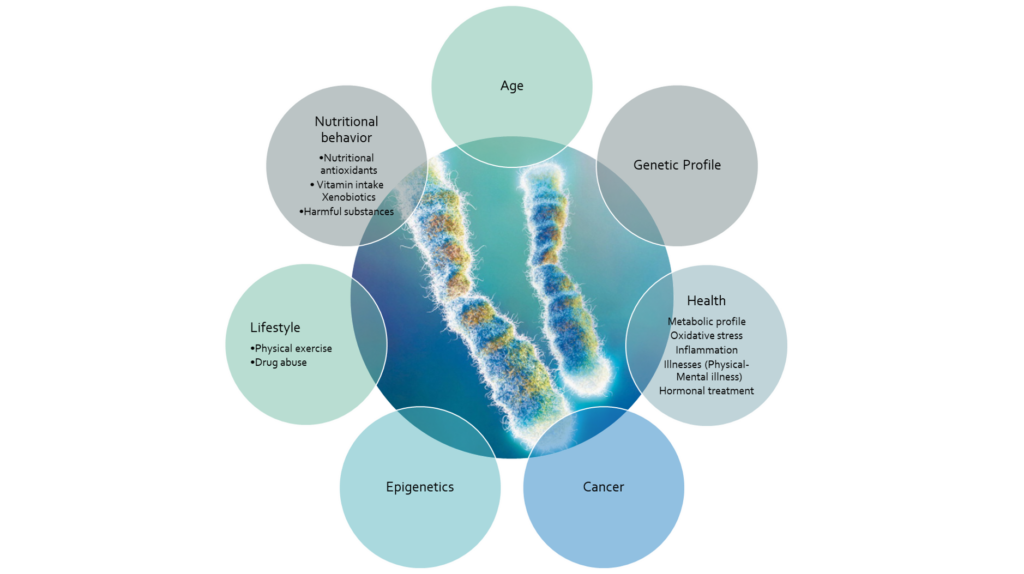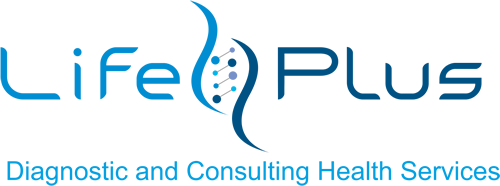Telomere Testing
WHAT ARE TELOMERES
Telomeres are located at the chromosome’s distal ends protecting them from deterioration or fusion after each cell division. As we grow old and each time DNA replicates itself during every cell division, a small part of the cell’s DNA is lost in each chromosome’s terminal regions. Hence, in order for the cells to sustain the integrity of DNA and functionality of chromosomes during each replication, they employ repetitive nucleotide sequences allied with specific proteins that create protecting formations called telomeres.
WHY MEASURE YOUR TELOMERES
Telomere’s role is to preserve genetic information, while helping chromosomes to sustain their structure, shielding them from deconstruction, recombination and fusion. Once telomeres are reduced to a certain limit, cell mechanisms are activated leading to cellular senescence (ageing) and apoptosis. According to numerous studies the acceleration of this otherwise physiological process has been linked with age related diseases and has been found to be induced by environmental and lifestyle factors. Hence, telomere characteristics can be a real-life risk simulator biomarker.
DOES LIFESTYLE HAVE ANY EFFECT ON TELOMERE LENGTH
The regulation of the telomeric final length is influenced and determined both by genetic and environmental factors.

LEARN HOW FAST YOU ARE AGEING, LEARN YOUR BIOLOGICAL AGE
An important indicator for identifying ageing is the deterioration of telomeres, demonstrating the biological age of the individual. Because biological age can change over time is vital to understanding what is good and bad for your health. There are a number of things you can do to slow your telomere attrition and your biological age and as a result to improve your overall health. Knowing your biological age is a big step in understanding the entirety of your health profile.
MEASURE YOUR TELOMERE LENGTH AND FIND OUT YOUR BIOLOGICAL AGE WITH LIFEPLUS TECHNOLOGY
LifePlus using state-of-the-art biomedical tools analyses a person’s telomeres characteristics and provides practical information associating a person’s biological with their chronological age and its potential impact on a person’s overall health status. Μeasure your telomere length and estimate your biological age by using Q-PCR and metaphase Q-FISH (Quantitative Fluorescence In Situ Hybridization) technology.
A small amount of blood is required to measure telomeric ends and to offer:
● the average and the median of telomeric length
● The percentage of short telomere length (> 3kbp)
● the assessment of biological age
Unlocking the Secrets of Fertility: The Telomere Connection
Telomere length is intricately linked to fertility, impacting both oocyte and sperm quality. Shorter telomeres in egg cells may indicate cellular aging and reduced fertility. Similarly, in sperm cells, shorter telomeres are associated with decreased sperm quality, influencing male fertility and potential impacts on offspring health. Telomere length extends its influence to pregnancy outcomes, affecting the development of fertilized eggs and embryo health. This connection significantly influences the chances of successful implantation and a healthy pregnancy. Τhe gradual shortening of telomeres over time is a natural part of aging, contributing to age-related fertility decline. Advanced maternal and paternal age, often associated with various reproductive challenges, may be influenced by the dynamics of telomeres in reproductive cells.
Why choose our Telomere Length Analysis?
Precision in Reproductive Planning: Gain personalized insights into your fertility potential based on telomere dynamics.
Early Intervention: Identify potential challenges and take proactive steps to enhance your reproductive health.
Scientific Excellence: Benefit from the latest advancements in telomere research, delivered with accuracy and reliability.
1. Vasilopoulos E, Fragkiadaki P, Kalliora C, Fragou D, Docea AO, Vakonaki E, Tsoukalas D, Calina D, Buga AM, Georgiadis G, Mamoulakis C, Makrigiannakis A, Spandidos DA, Tsatsakis A. The association of female and male infertility with telomere length (Review). Int J Mol Med. 2019 Aug;44(2):375-389. doi: 10.3892/ijmm.2019.4225. Epub 2019 May 31. PMID: 31173155; PMCID: PMC6605974.
2. Zahra Darmishonnejad, Farzaneh Zarei-Kheirabadi, Marziyeh Tavalaee, Masoumeh Zarei-Kheirabadi, Dina Zohrabi, Mohammad Hossein Nasr-Esfahani, Relationship between sperm telomere length and sperm quality in infertile men, Andrologia. 2020 Jun;52(5):e13546.
3. Jennia Michaeli, Riham Smoom, Noa Serruya, Hosniyah El Ayoubi, Keren Rotshenker-Olshinka, Naama Srebnik, Ofir Michaeli, Talia Eldar-Geva, Yehuda Tzfati, Leukocyte Telomere Length Correlates with Extended Female Fertility, Cells. 2022 Feb 2;11(3):513.

